
Petition for Unfair Peer Assessment

 Maxine K. signed
just now
Maxine K. signed
just now  Adam B. signed
just now
Adam B. signed
just now 
Dear Dean,
We are some of the honored students who are studying in the MBA program at UoPeople. We would like to begin by sharing our appreciation and admiration for your online education system and the rich information and syllabus we have experienced so far. This bounty of knowledge fosters and flourishes our thinking, intelligence, and greatly enhances our behaviors and attitudes on a personal and professional level.
Having said that we find ourselves obligated to draw your kind attention to one of the most concerning aspects of the charming and remarkable online education found in the University of the People, that being the peer assessment methodology. Our understanding of the Uopeople MBA Program and the studies online and with UoPeople, in general, is that we will be rewarded for our hard work and accomplishments. We believe this was one of the motivational factors in our decision to join the MBA Program with the University of the People, rather than participating in any other semi-online program from another school like Manchester Business School, for example.
During our previous and current courses, we found that some students provided low grades and ratings for the discussion forum assignments or the written assignments. Their comments were insufferably short and did not reflect or justify the reason behind the low scoring. In addition, some students just provided low grades or scores with no explanation or comments at all. This results in loss of motivation on the part of the students, destroying any ambition we may have built up, as we expect fair assessment and constructive feedback as a reward for our hard work of researching, overnight study, and writing the assignments (Isaac, Zerbe, & Pitt, 2001). We do not necessarily expect high grades, we expect fair assessment and an opportunity to learn and grow from the criticism of our work. We have tried many times to encourage our fellow students to understand the value of the peer assessment methodology, whether in the class forums or class discussions, with no luck.
We know that the online education system in UoPeople has a solution for this compelling ambiguity by relying on the vigilance of the veteran instructor/professor, but it is always anguish for us to ask our professors to revisit our grades and correct them if he/she think we deserve a better grade. We feel like we must go through this request every time we receive unfair grades. Despite the professional support from our professors who often show their support (unfortunately not all do). We beg you to find a better solution for this domineering effect of the peer assessment for us and for all other students who will face the same issue in the future.
There is one suggestion raised from a student. If a student does not assess fairly once, he should be warned by the professor. If he does so again, then a mark should be deducted from his total grade of the class. This is just an example.
Another suggestion from another colleague is first, develop a grading algorithm that factors in poor grading, e.g.: one that drops the skewed grade when getting the average. i.e. when 2 peers' grade 90 and one grades 60, drop the 60. or weight it accordingly, so that the algorithm factors in the inexperienced grader. etc.
Secondly, in the undergrad program they take an entire week training student on how to grade, they should include that in the orientation for grad students as well. (They can make the peer-assessment training mandatory.)
Thirdly, peer grading is standard in every profession, people need to learn how to do it in any event. Learning how to work the rubrics in every submission better all of us.
Whichever solution(s) you feel are viable means minimal change to existing structure: Change is hard and naturally resisted, particularly when it costs are involved. Therefore, the most acceptable change proposal is the one that costs everyone the least time, energy, engagement: A programming/computerized change, that does not then engage personnel (for an institution with almost 50,000 papers to grade weekly).
In conclusion, there is no penalty or sanction on the unfair peer assessment in the UoPeople Online Education system. Those who usually provide unfair scores know that they will not be penalized for their action. They might do it intentionally or ignorantly, but they must know that it is “wrong to harm other people without a strong reason for doing so, and they display compassion and even altruism toward others” (Goetz, Keltner, & Simon-Thomas, 2010; Turiel, 1983; Stangor, 2020).
Sorry for the lengthy letter, but your generous attention and professional support showed in your online videos on YouTube, encourage us to send you this petition with our yearning to continue our MBA Study with a high-quality education university like the one provided by the University of the People. This petition is signed by many students who share the same fate.
Thank you for your understanding and consideration.
Regards.
REFERENCES
Goetz, J. L., Keltner, D., & Simon-Thomas, E. (2010). Compassion: An evolutionary analysis and empirical review. Psychological Bulletin, 136(3), 351–374.
Isaac, R. G., Zerbe, W. J., & Pitt , D. C. (2001). Leadership And Motivation: The Effective Application Of Expectancy Theory. Journal of Managerial Issues, 13(2), 212-226. Retrieved from https://www.jstor.org/stable/40604345
Stangor, C. (2020). Principles of Social Psychology Version 2.0. FlatWorld.



Enter your details on the next page
Comment
See More 0